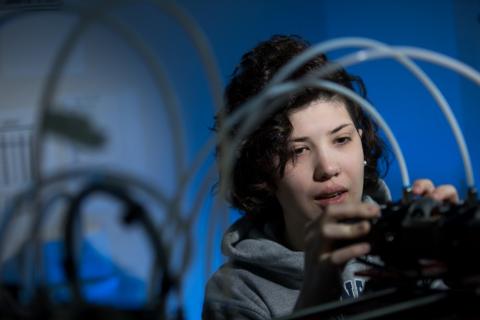Tech economy drives changes in education
September 13, 2018By Emma Leonard
Technology is reshaping every aspect of our lives, from work to recreation. Is it also reshaping our concept of what it means to be well-educated?
According to Dr. Bradford L. Sims, president of Capitol Technology University in Laurel, MD, the answer is a resounding yes. Education today increasingly needs to factor in tech, he says, because practically every human endeavor today involves technological innovation.
“It doesn’t matter what industry, whether it’s construction, manufacturing, or something else. There’s lots of new equipment being built and there’s always new technology,” Sims says.
Moreover, Sims notes, technology today involves highly specialized knowledge that can require rigorous effort to master – which is why more and more universities, like Capitol, are offering degree programs in specific tech fields, such as unmanned and autonomous systems.
“Twenty years ago, you didn’t really need to understand as much technology as you do today,” Sims says. “Now, it’s so much more specialized and complex.”
It’s no secret that technology is where the jobs are: a report from the Forbes Technology Council projects a 12% increase in employment opportunities in tech fields by 2024. The report singled out several specific areas of expertise – including artificial intelligence, cybersecurity, data science, programming, mobile apps, and applied machine learning – where demand is robust.
What is less widely known is that employers also value the “soft skills,” such as good communication skills and teamwork, which enable people and organizations to harness technology effectively.
In addition, the Forbes report found, they seek out individuals who not only possess expertise in a specific area, but have the broader aptitude that allows them to quickly grasp and adapt to new technological developments.
Dr. Helen G. Barker, Capitol Tech’s vice president of academic affairs and chief academic officer, says the university’s approach to technology education – affectionately dubbed “The Capitol Way” – is designed to produce well-rounded graduates with the mix of skills that the tech economy demands.
“When our students leave here they are able to go into a position in industry and be ready to hit the ground and go, so that they can become a contributing employee right away,” Barker says.
Technological literacy has become essential even for career paths such as business and management, Barker notes.
“If business leaders don’t understand the technologies, they’re not going to be able to lead these organizations into the future. So, these skills in these technology areas are going to be important at all levels.”
Taken together, the trends suggest that to be an educated person in the 21st century means something different compared to 100 years ago. In the future, we may call someone “highly educated” if they know multiple programming languages, have a deep understanding of fields such as robotics and artificial intelligence, or can assess the cybersecurity implications of a new municipal infrastructure project.
And universities like Capitol are leading the way.
Want to know more about the exciting, challenging degree programs available at Capitol? Contact us today for information about our undergraduate, master’s, and doctoral degrees.




